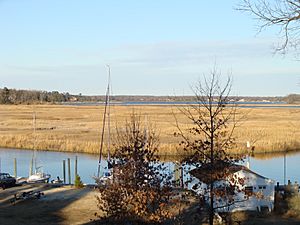Pagan River facts for kids

The Pagan River is a beautiful river in Isle of Wight County, Virginia. It flows for about 12.5 miles (20 kilometers) before joining the larger James River. The historic town of Smithfield is located right on the banks of the Pagan River.
About the Pagan River
The Pagan River starts about three miles north of Smithfield. At first, it is quite narrow. As it flows, it meets another stream called Cypress Creek. After this, the river gets much wider. It opens up into a large area of wetlands and marshes. Finally, it narrows again before flowing into the James River.
A Natural River
What makes the Pagan River special is how natural it still is. Unlike many other rivers, it hasn't been changed much by buildings or towns. A report from 2001 showed that most of the land around the river is still forests, fields, and wetlands. This means it's a great place for wildlife!
The River's Role in Smithfield
The Pagan River has always been very important to the town of Smithfield. Smithfield was first settled in 1634. It quickly became a busy trading port. Ships used the river to bring goods in and out.
Smithfield is famous for its delicious Virginia hams. For a long time, peanut warehouses lined the riverbanks. But after a big fire in 1921, the peanut business moved away. Soon after, a company called Smithfield Foods started up. It grew to become the world's largest pork producer. Its main offices are still right by the river today.
Even with Smithfield Foods nearby, the Pagan River remains mostly peaceful and natural. It's not as crowded as some other rivers. This makes it a unique and important waterway.
What's in a Name?
The name "Pagan River" might come from an old Native American language. It's thought to be from the Algonquin language word for "pecan." This word means "that which is cracked with a tool." When early explorers came to this area in the 1600s, they found many pecan trees growing along the river's banks.
 | Misty Copeland |
 | Raven Wilkinson |
 | Debra Austin |
 | Aesha Ash |

